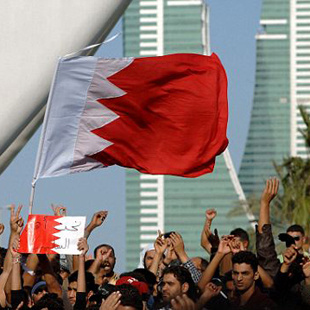The Termination of Al-e-Khalifa’s Legitimacy
A Hurricane in Pearl Island

The Al-e-Khalifa dynasty is now extremely worried about the rise of the third Arabic uprising in this country. On the first day of the protests, two Bahraini youths were killed by direct shots from security forces. The King of Bahrain announced his regret and appointed a Shi’a attorney, who was formerly the Minister of Justice, to investigate these events. The Minister of Interior apologized officially to the people of his country. But that was just one side of the coin. While the Bahrainis were expecting further responses from the government, on Thursday at 3 a.m., in an unexpected move, the security forces attacked the protesters who were mostly sleeping in Pearl Square, and they used so much violence that even the United States and the UN Secretary General had to react.
Malek Hamad squandered his public legitimacy overnight. Although suppression of protesters and the killing of people are not unprecedented and in the 40 years since the independence of this island such events have happened many times, the evidence shows us that this time the Bahraini uprising, which is happening in the aftermath of successive revolutions in the Arab world, has seriously worried Al-e-Khalifa.
The Bahraini royal family are worried that the United States, under the pressure of public demands, will be forced to reduce its unconditional support for Al-e-Khalifa. That is why the Cooperation Council’s (GCC) Ministers of Foreign Affairs rushed to Manama on Thursday in order to show their support for Al-e-Khalifa against the protesters. All evidence points to the “change hurricane” rapidly extending from North Africa to the Persian Gulf.
Perhaps before the 25th of Bahman, only a few people could think of any countries in the southern Persian Gulf to be susceptible to public revolution and widespread protests, but now Bahrain is at the top of all news in the Arab and regional media. And it is not improbable that before Jordan, Algeria, Libya and Yemen, where public protests have reached their climax, the Bahrainis will outrun all of them and make the third Arabic Revolution in their own name.
The opposing political leaders, though being pioneers in the political evolutions of this country in the last four decades, but who this time had been left behind by the youth and their Facebook and internet innovations, quickly tried to catch up with the new uprising of the youth.
Hizb-al-vefagh, the major Shi’a opposition party, suspended its membership in the parliament and, after the police raid at dawn on Thursday, publicly announced that the Al-vefagh fraction would never go back to parliament.
Bahrain’s monarch, Malek Hamad, who 12 years ago tried to earn the Bahrainis’ support by a deceptive and reformation motto, is now entrapped in a vast chasm that he probably cannot easily pass through. In spite of his false pretense in accompanying the people in the first day of these events, he dispatched security forces on Thursday to Pearl Square, where protesters had taken refuge, and forced the youth out of the square with compulsion and extreme violence.
Security forces clashed with people and at least three more were killed. This excessive paradox in Bahrain’s king’s approach brought about the idea that considering Malek Hamad’s weak character, the country’s elderly Prime Minister, with the help of some Arab neighbor countries especially Saudi Arabia, has decided to use the iron fist and eradicate the protesters.
Before the Thursday dawn event, the youth and the opposing political leaders of Bahrain had demanded the realization of Malek Hamad’s promises, which he had made 12 years ago and had instantly taken back. The first priority of these demands was the establishment of a constitutional monarchy, in which the government is chosen by the elected parliament. This demand means Sheikh Khalifa Bin Salman’s 40-year Prime Ministry must be ended. The people believe that Sheikh Khalifa has been the main cause and behind the scenes of all the injustices in the past 40 years.
Nevertheless, some of the youth in Pearl Square had proclaimed harsher demands and, like the Egyptians, were demanding the government’s downfall. The violent suppression of the people caused an increase in people’s demands and the extension of the demand of Al-e-Khalifa’s downfall.
In the clashes between the opposition and the government, there is an issue that should be taken into consideration: this small island is where the US Fifth Fleet is stationed, and the Americans observe this country’s events closely and carefully. However, it seems that with the foundation of the Arab revolutions and the hurricane of Arab nations’ wrath, it will be difficult for Americans to close their eyes to the Bahraini people’s demands, with the excuse of the presence of the US Fifth Fleet in that country.
The US Fifth Fleet is not more important than the Camp David Accords and Israel’s security. In spite of their worries about Israeli security, the Americans finally had to accept the Bahrainis’ demands after 18 days; therefore, it is not unreasonable that Al-e-Khalifa is now feeling a threat more than ever. Malek Hamad bin Isa Al-e-Khalifa is going on the same path as what Ben Ali and Mubarak have already been through.
After US officials’ criticism of the use of violence against the protesters, he must have found out that the Americans, under public pressure, would soon end their support for Al-e-Khalifa and would demand change. We have to wait and see how much the Sheikhdoms in the southern Persian Gulf, which are gradually losing the US support, can help each other through the ever-increasing protests of their people.

